This is the first Reading Post in many years that I’ve published for the first (and only) time right on my main (now my only) blog. Past experience has shown me that many of you are not as interested in what I’ve been reading as in other topics I write about here. But I also know that there is a very engaged, if small, community of readers here (pochi ma buoni, as I’ve learned to say in Italian), and I hope we will continue to enjoy our conversations — perhaps with so much enthusiasm that others will join in.
Since more of you, perhaps, are curious about What I Wore than about What I Read, here is a consolation prize, a sop, for stopping by. I don’t know that I could call this an Outfit of the Day (#OOTD, as the hashtag has it ;-). . . is it an Outfit, when one simply pulls on a dress and ties up her Stan Smith trainers? Perhaps it qualifies, simply on the basis of my having bought the dress in Paris a few years ago 😉 (mentioned it in this post about shopping in Paris). At any rate, it’s a perfect (and perfectly easy!) combo for heading out on my walk, of an afternoon. . . . and then when I get home, I kick off the shoes and curl up, comfortably clad for reading on the couch
.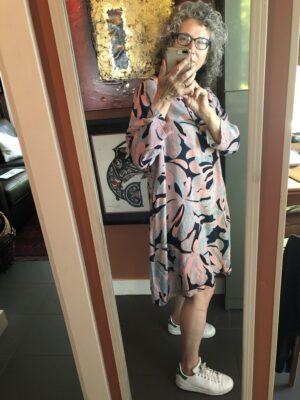
Or for sharing my list of Books I Read in May (numbered according to their place in my 2021 Reading Journal):
34. My Heart: A Novel, Semezdin Mehmedinovič, translated by Celia Hawkesworth. Auto-fiction; Illness; Road trip; Immigrant narrative; Bosnian war; father-son; marriage.
35. The Butterfly Man, Heather Rose. Mystery; Tasmania; Redemption.
36. Floating in a Most Peculiar Way, Louis Chude-Sokei. Memoir; African diaspora; Black Lives Matter; Black America; Jamaica; Biafra.
37. Such a Fun Age, Kiley Reid. Literary fiction; Bestseller; Coming-of-Age; Race and Privilege; Black Lives Matter; Childcare. Comedy of Manners
38. The Detective’s Daughter, Lesley Thomson. Mystery/Thriller; Series; London; Female detective.
39. Ghost Girl, Lesley Thomson, Mystery/Thriller; Series; London; Female detective.
Those of you who have followed my book blog will know that in 2019, I began keeping a hand-written Reading Journal, and instead of writing my responses to each book on a keyboard and posting them directly to Materfamilias Reads (defunct, as of last month), I made brief, rough notes on a paper page in ink, generally written with one of my fountain pens. And while I think I might have transcribed some of those early pages on the blog, I soon decided that I would simply post photographs of those pages without any transcription, although I would happily “translate” a phrase or sentence for anyone who couldn’t decipher my script.
This change saved me time and thus contributed to the sustainability of a second blog. But it also served a more ephemeral, perhaps eccentric, purpose, a simple attention to the non-digital. An engagement with “analog” materials. Good old ink and paper. Letters formed by fingers in fine-motor movements that held a history of grade-school teachers, of epistolary relationships, of journals and work forms and grad-school applications and months and months of note-taking in university libraries as I prepared for PhD field exams. And thousands and thousands of words in the margins and between the lines of my students’ submitted coursework. (Ah, marking, how I do not miss thee!)
I’m not sure my quirky decision serves my readers well here, and now that I’m not maintaining a second blog, I may decide to continue keeping the hand-written record but perhaps offer a typed transcription here as well, or instead. For today, though, I’m afraid you will once again have to contend with my green fountain-pen ink. If there are sections you’d like me to decipher for you, let me know in the comments.
Here we go:
The first book I read in May was this beautiful novel My Heart, recommended to me by my Croatian friend, a regular reader and commenter whom you will know as Dottoressa. When she recommends a book, I generally add it quickly to my To Be Read list.
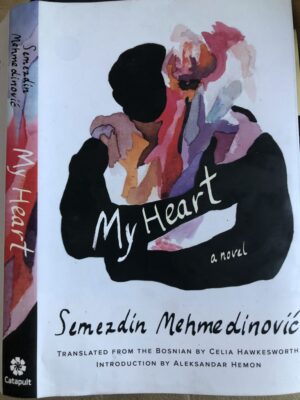
Here’s my entry for it — somehow I forgot to include the title and didn’t notice until now. . . 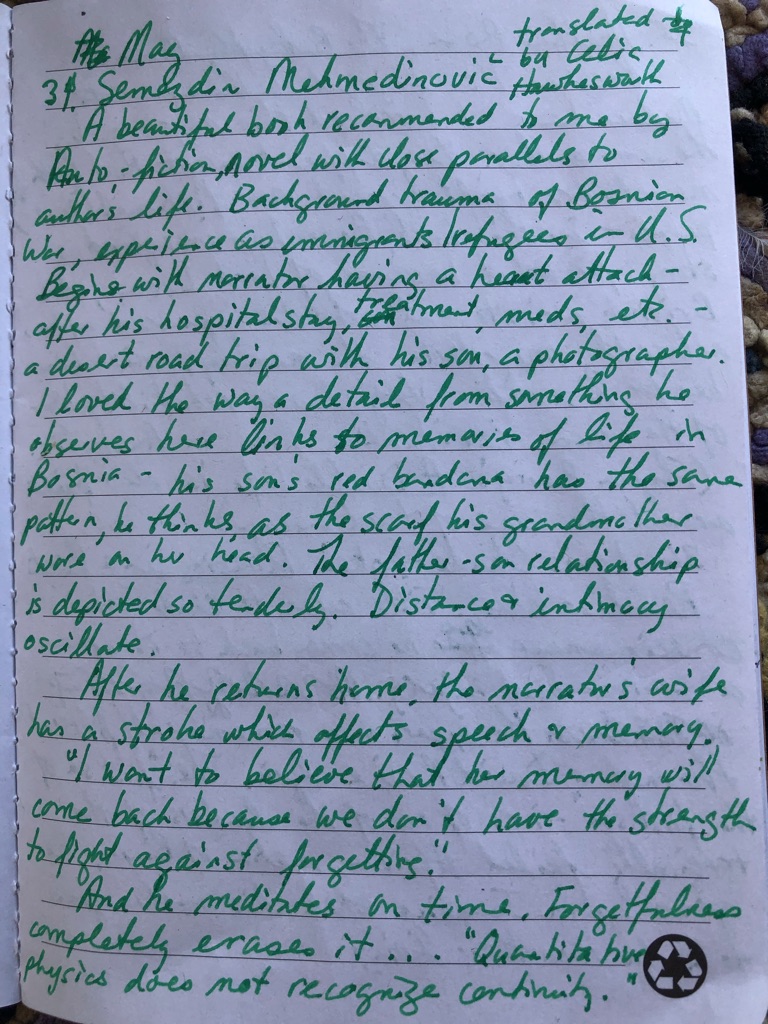
I have so many post-it notes throughout this book marking passages I want to come back to. On page 57, for example, when a friend calls from Ljubljana just before midnight, the narrator explains that he and his son are “parked in the dark somewhere on the border between Arizona and Utah.” Seated in the passenger seat, he tells his friend Aleš, “I felt as though I had gotten lost on my way home. I didn’t know where I was.”
His friend is amused by this and compares the English expression “home, sweet home,” with one he and the narrator are more likely to say, “Love home, wherever it is.” Aleš goes on to say that “In principle, no one can call an American’s home into question, so he can simply state that ‘home is sweet,’ while it’s different for us, for us the existence of a home is always questionable: you can love your home only if you have one.”
The narrator then tells us about Aleš coming to visit the narrator and his family in America, in 1996. Suffering with a virus, he treated himself with propolis drops (“winter medicine from bees at the time of Yugoslavia”). Remembering this, he tells us, “suddenly the car filled with the scent of an Alpine plant!” — and these moments where present and past collapse into one another happen often through the novel. I’m so tempted to share more of these with you, but then I’d never finish this post. I might slip a passage or two into upcoming posts, or perhaps we can have an extended chat in the comments, below.
And Eleanor Wachtel interviewed Mehmedinović about My Heart on CBC Radio yesterday. I haven’t had a chance yet to listen to this, but she interviews writers so well, I’m sure it will be worth a listen. (Monday morning, editing to add that I listened to this interview during my afternoon walk yesterday, and it’s very good. Especially for those of us who so far have lived such protected lives.)
I posted briefly about My Heart on my Instagram reading account.
Book #35 in my Reading Journal, Heather Rose’s The Butterfly Man — (I wrote about her The Museum of Modern Love here).
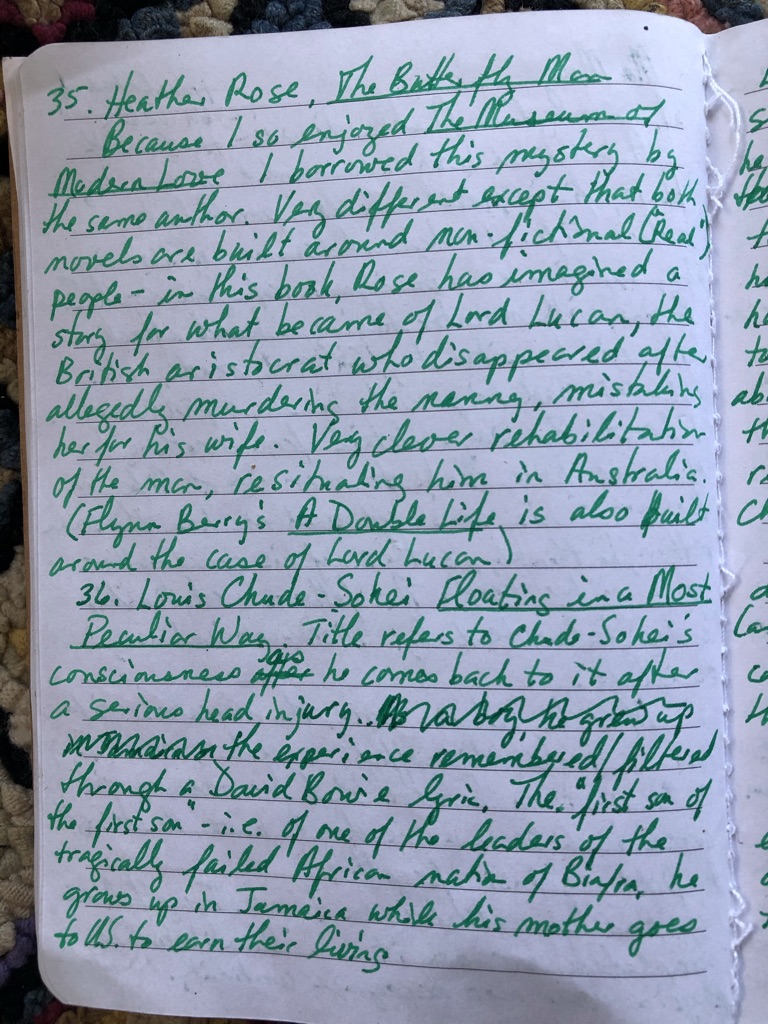
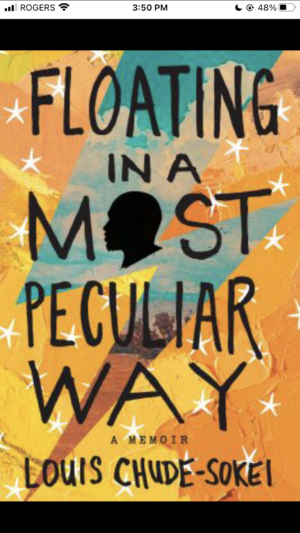 36: Louis Chude-Sokei’s Floating in a Most Peculiar Way. Wonderfully literary and entertaining memoir. Explores Black identity from the perspective of someone whose parents played an important role in the creation of Biafra, who grew up in Jamaica and then moved to Los Angeles.
36: Louis Chude-Sokei’s Floating in a Most Peculiar Way. Wonderfully literary and entertaining memoir. Explores Black identity from the perspective of someone whose parents played an important role in the creation of Biafra, who grew up in Jamaica and then moved to Los Angeles.
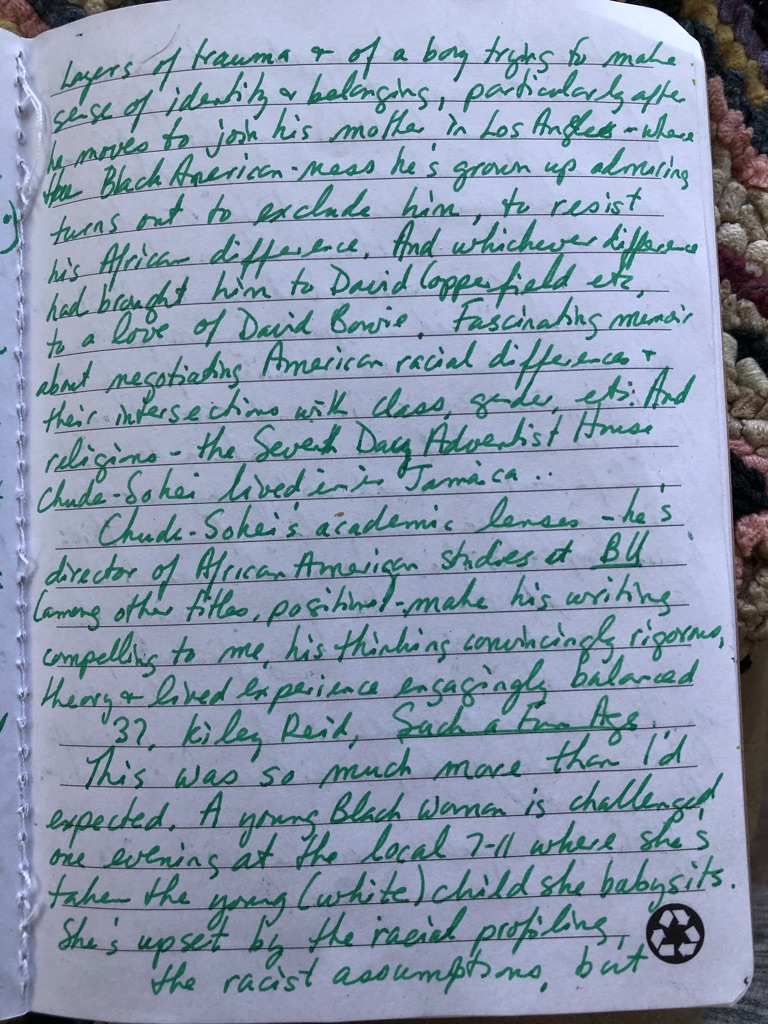
37. Kiley Reid, Such a Fun Age. Reads like a beach book, but also illuminating and thought-provoking.
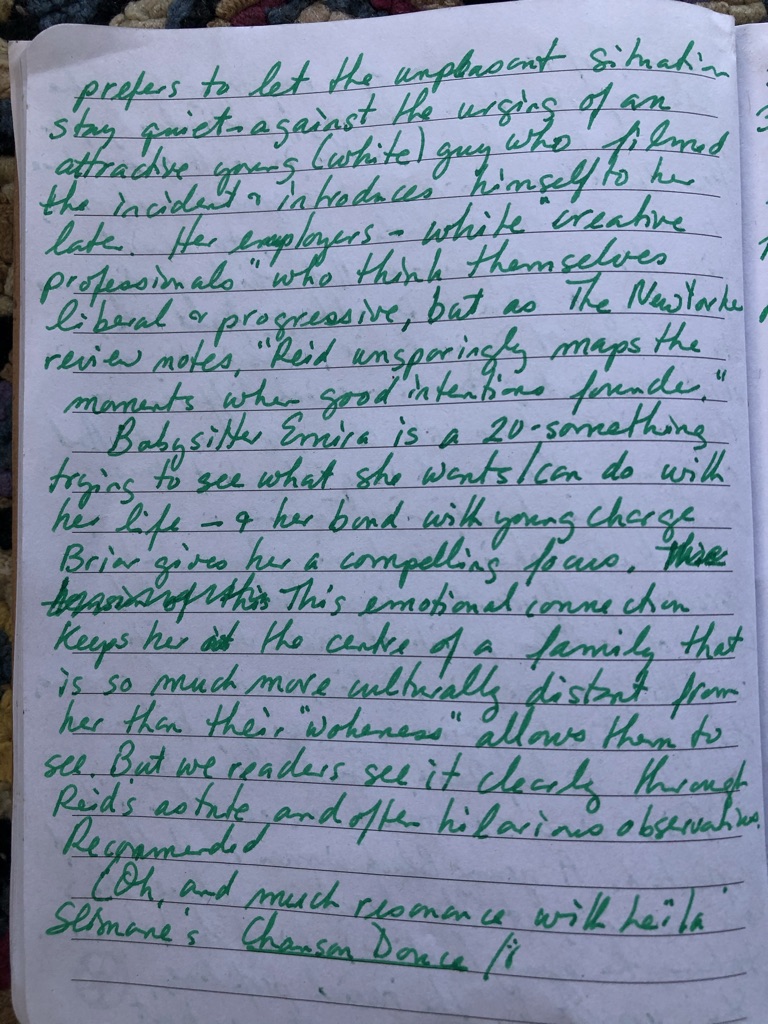
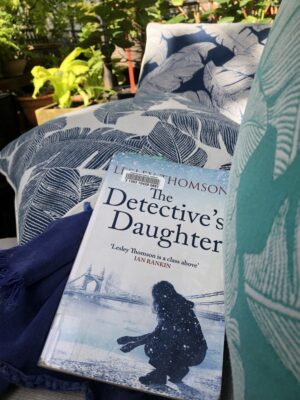
2021 Books 38 and 39 are both by Lesley Thomson. The Detective’s Daughter and Ghost Girl are the first and second in Thomson’s “Detective’s Daughter” series, and the fact that I borrowed the second from the library immediately after finishing the first should tell you two things: I liked The Detective’s Daughter very much (and was not disappointed at all by Ghost Girl) . . . and that I was in the mood for some prolonged escape reading.
I should confess that I’m tempted to put the next book in the series On Hold soon.
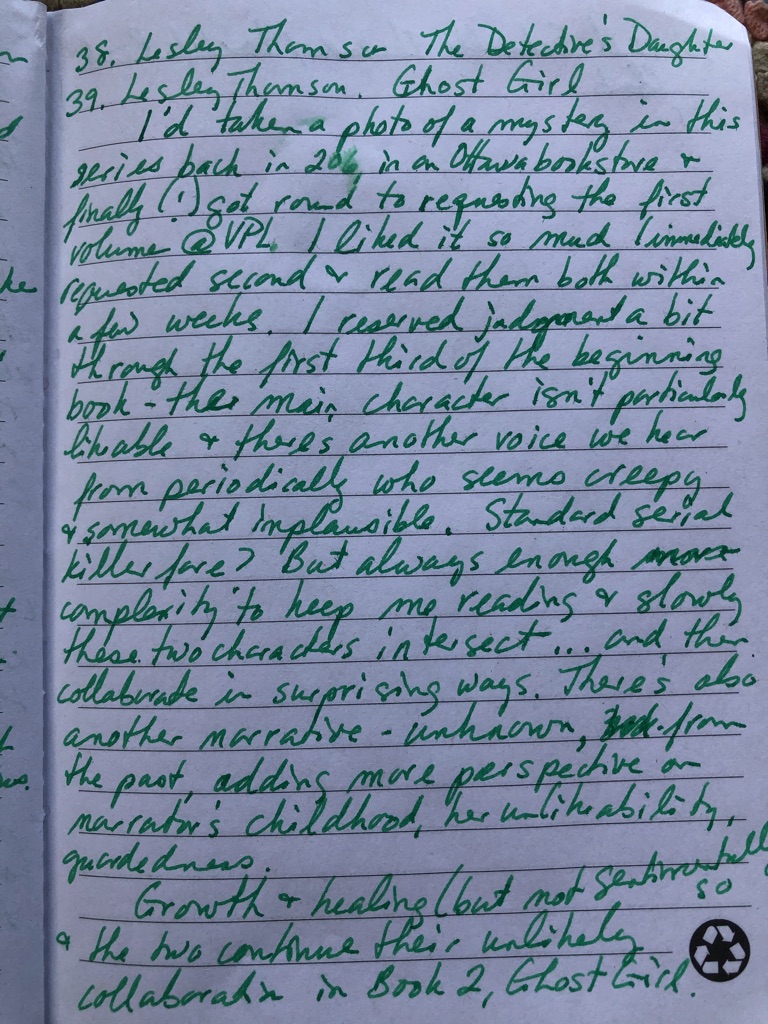 And the last book I read in May was Will Schwalbe’s The End of Your Life Book Club. The context (a son writing about what he and his mother read and discussed together after she was diagnosed with pancreatic cancer) means the memoir is undeniably poignant, but it’s uplifting overall. (although I couldn’t help but wish I’d made more effort to talk about books with my mom, a keen and inveterate reader until cognitive impairment got in the way in the last year or two of her life. Even then, I remember her telling me ruefully that she was bringing home books from the children’s department. She didn’t have the concentration for anything too challenging, but she couldn’t bear letting go of her page-turning habit.)
And the last book I read in May was Will Schwalbe’s The End of Your Life Book Club. The context (a son writing about what he and his mother read and discussed together after she was diagnosed with pancreatic cancer) means the memoir is undeniably poignant, but it’s uplifting overall. (although I couldn’t help but wish I’d made more effort to talk about books with my mom, a keen and inveterate reader until cognitive impairment got in the way in the last year or two of her life. Even then, I remember her telling me ruefully that she was bringing home books from the children’s department. She didn’t have the concentration for anything too challenging, but she couldn’t bear letting go of her page-turning habit.)
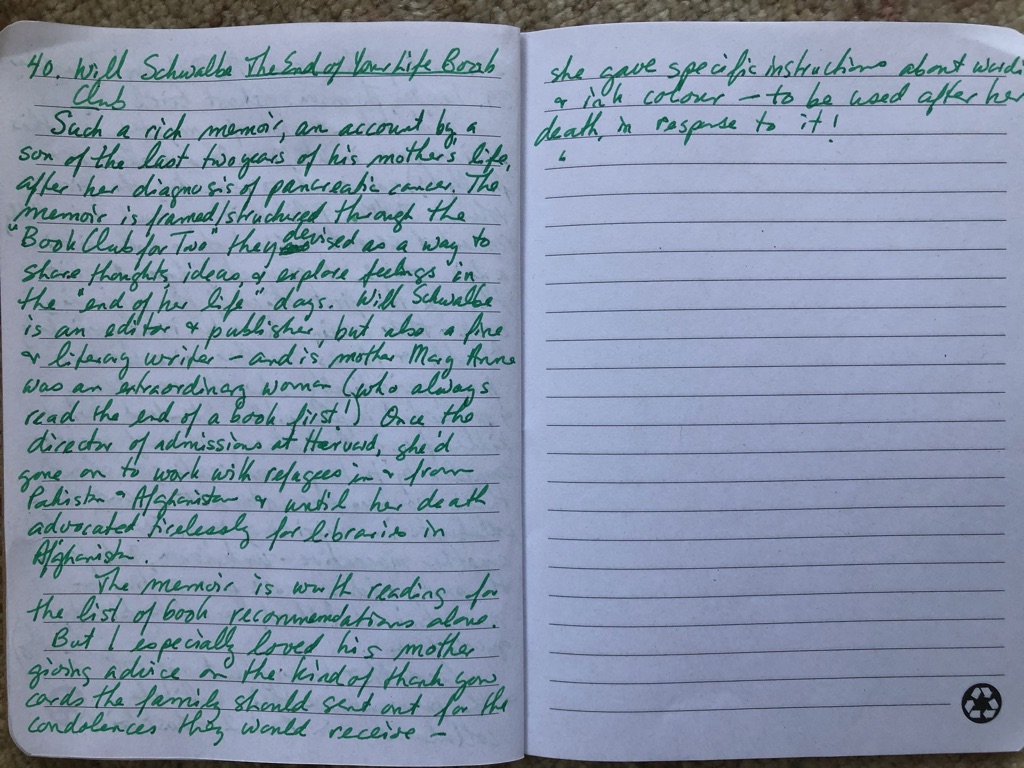 If I hadn’t had to return this to the library so quickly (a long line of readers were waiting for their turn), I’d have chosen a few passages to share. I did post a favourite excerpt on Instagram and if you pop over there, you’ll see that the author, Will Schwalbe was kind enough to thank me for sharing it (it’s always a bit of a fangirl moment when writers take the time to do that!).
If I hadn’t had to return this to the library so quickly (a long line of readers were waiting for their turn), I’d have chosen a few passages to share. I did post a favourite excerpt on Instagram and if you pop over there, you’ll see that the author, Will Schwalbe was kind enough to thank me for sharing it (it’s always a bit of a fangirl moment when writers take the time to do that!).
That’s it for my May reading, in a post that’s slightly bittersweet for me: exciting to be integrating more about my reading here in this rejuvenated blog, having all the possibilities in one site; but I think of some of the rich and prolonged conversations we’ve had about books at Materfamilias Reads, and I rather wish I had the energy and other resources to keep it going. But onward, my friends. Onward. After all, that famous elegy concludes thus: “Tomorrow to fresh woods and pastures new.”
You might like to know that I just corrected a sweet “Freudian typo: “to fresh words and pastures new.” So oblige me, please. I’d love your “fresh words. Any comments about my May reading are welcome. Or about that May #OOTD. Or about what you were reading in May OR what you’re reading right now. Just jump in — let’s chat! (Note to those of you who read this on Bloglovin’ — Please know that if you comment directly on Bloglovin’ (look at the URL in your browser, if you’re not sure; if you’re at my blog, you should see “materfamilias writes” and “Bloglovin'” will not appear in the URL) rather than clicking through to the comments here, I’m very unlikely to see what you’ve written . . . which makes me sad, honestly, and means that you miss out on being part of a lively conversation right here.
xo,
f
Always enjoy your reading lists, thank you! I thought the pandemic would invite a great deal more time for reading, and that’s been true, but I also moved heavily into podcasts, as life turned stranger than fiction, and I found the forty-five minute spans good for walking and listening.
Author
I never used to listen to podcasts, wanting to preserve a space of silence while walking. . . but then I discovered what a boon they were for developing my aural comprehension skills in French and Italian! And what a rabbit hole I have to disappear into!
I think I prefer finding you bookpost in your regular blog. In the last years I often missed a post on your book blog or only read it at a time when I felt it was too late for commenting. After all, reading is a part of everyday life, one (important) activity of many.
My reading suffered a bit during the time of the move – books tucked away in boxes, no time to go to the library, no inclination to buy anything… But on the other hand having to handle each book twice in the process of packing and unpacking, I rediscovered some books I decided to read again. One was Carlo Levi: Christ stopped at Eboli, which I read some 50 years ago. It describes the author’s “banishment” to southern Calabria in the times of Mussolini. And after re-reading it in German, I got myself a copy in Italian and am now reading it for the third time. Two more books I read happened to cover parts of Italian history as well: the autobiography of Franca Magnani (no relative of the actress), a journalist of my parents’ generation who used to work for German TV. I remember watching her reports from Rome as a young girl, presented in a somewhat exotic accent. Which was, as I now know, Swiss, because she grew up in Zürich, her parents being exiled during Mussolini’s reign. The other book was the – rather clumsily written – autobiography of Ingrid Bergman which described – among other things – life in postwar Italy where she went to live after falling in love with Rosselini and filming “Stromboli” with him.
Another discovery in my bookshelves was “One Hundred Years of Solitude” by Gabriel García Márquez. Which I had read twice already, both in German and Spanish. And reading it again after almost 40 years I am shocked at the number of things I had forgotten. On the other hand, there are some images which stuck with me and always will, I suppose, like the long train full of dead bodies to be thrown into the sea after the masasacre on the banana plantations, or the rain which lasted so long that there was no dry spot to be found and the fish would swim straight through the houses.
Author
Eleonore: I’m glad to know this integration of blogs works for you — and I agree that it works in principle as well, integrating reading into everyday life.
I know what you mean about that packing and unpacking of books — even last fall when we repainted the room with all the bookshelves, handling each book as I cleared the space meant some resolutions about rereading, and I put a few aside for that reason.
What a coincidence that you’re reading Christ Stopped at Ebola. This is one on my Must Read Soon list, because it keeps coming up in my Italian classes. I read Levi’s Words Are Stones when we were preparing for our (cancelled) Sicily trip and right now I’m working my way through a few chapters/linked short stories from Primo Levi’s La Chiave a Stella, my instructor’s choice for our final Book Club meeting of the year. Reading in our other languages is such an interesting phenomenon, to me, and the work of a translator fascinating. If I had five decades ahead of me still . . . .
Isn’t it wonderful what riches your own bookshelves offered you while you were too busy to get to the library?!
Carlo Levi and Primo Levi were both from Turin, and both committed antifascists as well as (secu;ar) Jews. When Carlo was exiled, antisemitism was at most an undercurrent. The older Levi actually returned to Italy when the situation was far more dire in “racial” and political terms, “hiding in plain sight” as an Italian gentleman of a certain age.
Author
Thanks for this. I do know a bit about their biographies and their work, but I appreciate learning more from those who know more about them and have much greater familiarity with Italian literature.
My reaction to your dress when I saw the photo on Bloglovin’ (not yet having read where you got it) was “this is how all French women dress in summer.” I just got a similar dress yesterday. It’s like walking around naked. How to beat the heat with elegance. I would like to go full caftan, but I am too short to pull off a long dress.
I’ve been on a reading jag. I read “Soumission” by Michel Houellebecq, which was very controversial a few years ago. Nobody likable in the entire book. All the women end up sidelined. But that seems to be part of the point of the book–that French men could adapt quite well to an Islamic government because it would legitimize their misogyny and also remove much of the competition for career advancement.
Then I read “Tinker Tailor Soldier Spy,” by John LeCarré. Exquisite bits of writing sprinkled through what is basically a story about office politics much more than about geopolitics. It was written in a different era than “Soumission,” but you can see some similarities as far as attitudes toward women go.
Yesterday I finished “Those Who Leave and Those Who Stay,” by Elena Ferrante. Utterly brillant commentary on the relationship between men and women. I related to it far more than I would have liked. And it basically confirms what’s in “Soumission,” even though it is set in a different era, one in which sexism was taken for granted and only started to be questioned.
Because I get my books from the public library or, for the English ones, on trips to Paris (I won’t give a centime to Amazon), my reading list doesn’t include the latest releases.
Re interest in a book blog: I like reading intelligent discussion of books and the ideas in them.
Author
Taste of France: It’s true, like walking around naked but much less likely to get a sunburn (or arrested, for that matter 😉
I haven’t read either Soumission or Tinker Tailor soldier Spy, but I so agree with you on Ferrante’s novel. Such an important series.
I’m so lucky with our public library — they have copies of the latest releases quite quickly and I can easily put a Hold on a title — of course, I’m often joining a very long queue! 😉 (I’m with you on Amazon!)
Shall I break the ice…?
Thank you,Frances for your kind words!
I really loved My Heart (it has a charming and more complicated title in Croatian)-Mehmedinovic writes so beautiful and poetic,every sentence is to think about and remember,like some great writers from his background, contemporary or classics like Ivo Andric (Nobel prize winner) and Meša Selimovic
Yay,looking forward to read Lesley Thompson’s books and Chude-Sokei’s book!
I’ve read Such a Fun Age,as well and second your opinion,I liked it.
After latest Sue’s post,I’ve enjoyed Janice Hadlow’s The Other Bennet Sister, as well as P.D. James’ Death Comes To Pemberley.
I’m still loving Peter Lovesay’s Peter Diamond books (I’m afraid-only two to go…)
I have read Ruth Ware’s psychological thriller In a Dark,Dark Wood-it was a pleasant surprise and her first book,better than her The Woman in Cabin 10 ,interesting and well written (the end may be a little bit stretched)
Islandic author Auđur (sorry,have not adequate letter đ) Ava Ólafsdóttir’s Hotel Silence is a wonderful book. It is about life,starts in Iceland with potential suicide to be,the meaningless life and ends in a certain country after the war (it could be any of those,but I read it right,I’m sure! You could see for yourself,maybe one could find different countries for oneself….) with memories of horrible war crimes and losses,where life has its value even after such a catastrophe,about good people and bad people….and how help and giving has benefits for both sides……
I guess that Nancy has recommended another book from the same author some time ago…Miss Iceland,I’m looking forward to read it
Dottoressa
Author
Can you translate the Croatian title for us? I so agree with what you say about each sentence in the book giving something to think about. This is one I will read again and will pick up often just to reread certain pages or read pages at random just because I know I will find those thought-provoking and lyrical sentences.
I read those Ruth Ware books a few years ago and enjoyed both. Also read and enjoyed The Lying Game.
I’ve just googled Hotel Silence and it looks like one for my TBR list. You are a major reason I will never get caught up! 😉
We’re both guilty for never ending TBR lists…..
The title is “Me’med,crvena bandana i pahuljica”
“Me’med (simplified name for the author in the hospital),Red Bandana and Snowflake”- it is more connected with main characters than My Heart,but the english title is pretty good,too
D.
My goodness, your first book certainly captured my attention as I worked with Sanja, Mehmedinovic’s wife, (refugee resettlement work) in WDC for many years before she became ill. To know that she is back in Sarajevo is quite amazing. I surely hope her health has improved. She talked often and with great pride about her son Harun’s many talents, too. He is now a quite well-known director, screenwriter, photographer, cinematographer, and author. Will have to get Semezdin’s book. My thanks to you and Dottoressa for the recommendation.
Thank you, Mary! How amazing! This world is really a small one! I hope she is well,too.
D.
Author
Wow! How surprising to know that a reader here met Sanja. . . That means only three degrees of separation between me and Mehmedinovič, if my arithmetic is correct! 😉 I’d say you MUst read this novel.
And what a coincidence that this refugee resettlement work connects you and Sanja with another book I read this month — did you ever cross paths with Mary Ann Schwalbe, memorialized in her son’s book The End of Your Life Book Club?
Always enjoy your book recommendations. I will keep in mind My Heart for our Global book club, I do not believe we have have done a Bosnian author. We have just finished Hungarian author Magda Szabo’s book Abigail, about young girl sent to a strict religious boarding school during WWII. Darby
always
Author
Glad you enjoyed the post, Darby.
I haven’t read Abigail, only Szabo’s earlier Iza’s Ballad. And I’ve been meaning to read The Door. Did you like Abigail? Had you read earlier books by Szabo?
I did enjoy it. And a friend recommended The door which she read a year or two ago. I am so happy I found this global book club, so many books which might not have been on my radar. I came to it as the result of a series of coincidences. In addition to the literary benefits I met a group of lovely women and we have become good friends. In fact, this Thursday we plan to go out to dinner, something we have not been able to do in over a year! Darby
Author
Lucky you! Your book club sounds great — and then to go out for dinner together, cherry on the cake! Enjoy!
Just stopped by belatedly to say I am going to look for those those Lesley Thomson books, plus the Heather Rose one. I enjoyed Such a Fun Age. Loved the varying depictions of being “woke.” Still don’t really get why the mum in the first chapter sent her kid out with the babysitter to the all-night grocery at 11:00 at night. Cops in the house or no cops. I kind of forget the reason she gave, but still seems contrived to me.
Thanks for all the book recommendations. You are better than book club. Way better! xox
P.S. Now going to put some ice on the arm that received my second shot this morning. Yah!
Author
I know, right? But I suspect the equivalent has happened; I think that sense of entitlement has become so entrenched in some that such an action just seems like a common-sense deployment of resources. Or something. Did you ever read Leila Slimane’s The Perfect Nanny? definitely echoes here, but that went so much darker, right from the beginning (although both featured cops in the house, at the outset).
So pleased you’re fully vaccinated now, and I hope you’re soon able to visit your Mom
And I’d love to know what you think of the Lesley Thomson books.
I read and enjoyed Such a Fun Age last year on the recommendation of my daughter. It was an interesting and challenging book in terms of its depiction of the pervasiveness of racism. Kiley Reid is much younger than me and I also appreciated her views on current career and relationship dynamics. I’m currently half way through and loving Heather Rose’s Bruny, which is quite different to Museum of Modern Love and perhaps more like The Butterfly Man, which I will add to my reading list.
Author
Yes! Such a Fun Age was about so much more than race. The generational difference — and then the way class was showing up in Emira’s circle of friends as some were beginning to climb various career ladders and she felt stuck. . . surprisingly nuanced.
I looked for Bruny after you mentioned it earlier, but it doesn’t seem to be available here at the moment. The Butterfly Man is based on the real-life story of Lord Lucan (disappeared after the murder of the family’s nanny) . . .fascinating take on that.
I love your combined blog, Frances. And I love the green script – please don’t even consider transcribing your comments. What a lot of work that would be! Your reading notebooks will be treasured by later generations, I am sure!
I’ve put myself on the library waiting list for several of the books you mentioned. I’m currently “reading” (in quotes because I only use audiobooks for non-work reading) The Light of the World by Elizabeth Alexander. It’s wonderful! I recently finished This Tender Land by William Kent Kreuger. I loved it, and now I want to read everything he’s written. I’ve been re-reading Elizabeth George’s mysteries this year, as well.
Author
Oh, thank you, Marie! I can imagine the handwriting being annoying to decipher, but on the other hand, I think there’s so much that wants to smooth us all out into a tidy homogeneity these days, I guess I’m wanting to resist a bit (or I’m just lazy! 😉
I have never managed to get into the habit of audio-books, and now that I’ve created the different habit of listening to French or Italian podcasts while walking (to improve my language skills), I suppose I’ve put that off for a bit longer. What a boon, though, for those who want to spare their eyes or be less sedentary or just be soothed by following a story in a different mode. I’ll make a note of both those books.
Years ago, when I worked at a bookshop for a few months, one of the other employees was working her way through the Inspector Lynley mysteries for the second time, back to back, and I remember her telling me how interesting it was to experience them in the more compressed time in which the fictional events had happened. Perhaps you’re finding something similar?
Yes, I am! I don’t know if you’re familiar with the series, but there’s a sizable cast of recurring characters and following their lives and relationships is as interesting as the crime and resolution.
Author
Yes, I’ve been reading them since the beginning, and those recurring characters and the long narrative arc is a huge part of the appeal for me. I’d love to read through them all again, although I’m not sure I could stand to bump back my TBR list for that long. . .
Bonjour, Frances! I like the new look of your blog. I admire your pluck and resolve in organizing your thoughts and publishing. That’s a bigger job than non-bloggers know.
I’m reminded how personal, singular, quixotic we readers are in what we select, how we consume, and what makes us tick. Three years ago I was lured into reading and posting on IG in a double-whammy challenge; the initial brief was examining how present-day writers got commercial/popular fiction published. Momentum established, brief expanded, I renewed my near-dormant reading mojo with backlists, non-fiction, and new genres.
My latest foray has been a dual encounter with the same book: I’ve been reading Barack Obama’s A Promised Land and listening to him read the memoir as an Audible book. The appeal—and satisfaction—of each is utterly independent, yet, magnified, one by the other. Incomparable to listen to this particular writer …
Summer. Books. Bliss.
Congrats on the new blog format and the way you’re folding in books of note. (I admit I read only the comments you commit to text.) Well done, you.
Borrowing the one memorable quote of a new Netflix series binge:
You’re cool.
You’re hot.
You’re Baked Alaska!
Cheerios, Deborah
I listened to Obama’s book as well! Hearing recent history from his point of view was fascinating. And what an intellect. I often get book suggestions from his recommendations. The Light of the World was either his recommendation or Michelle’s. I’m on the waiting list for The Overstory, a recent recommendation of his.
Author
Thanks Deborah! Yes, it’s interesting how singular and quixotic we are in our book reading — although I’m not sure if we’re more or less so these days of social media. . . and of Amazon. We have the potential exposure and access to so many more possibilities than when, in my 20s, say, I’d find books at the public library or the local small-city bookshop. But “curation” and “influence” seem powerfully directive. . . After so many years with the bulk of my reading done just to stay abreast in my field, I’m loving a return to a more random selection based on a variety of referring sources. Reminds me of the way I’d choose my books at the library each week, as a kid and then as a young adult. Wandering the shelves, pulling out possibilities based on the temptations of their spine, reading the flyleaf blurb, keeping or putting back. . .
Yes to Summer! Books! Bliss! . . . and tickled to be Baked Alaska, thank you (what’s the Netflix series — although if it had only one memorable quote perhaps you’re saying you don’t want to be an influencer on this 😉
The binge (hangs head in sleep-deprived shame) is Flack Season 2. It is dreadful. My only lame excuse is that I, like you, noticed a certain relaxation of housekeeping during covid isolation and ran the series as I attempted to make the first floor presentable again. (Looks like an episode of Hoarders: The Bookshop Years.) Books, magazines, notebooks everywhere.
The comedian a fledgling PR assistant is trying to recruit as a client builds the younger woman’s confidence by assuring her that her new, tiny diamond nose piercing looks good. “You’re cool. You’re hot. You’re Baked Alaska,” was the ONE fun exchange in SIX episodes. Jus’ sayin.’
Finally, I identify completely with early addiction to libraries. I looted the city, county, and school bookmobile as a kid. Thought librarians were angels. Later, shelves of books, china, and wine glasses were my signature treasures. And so it goes to this day!
Cheers. Deborah